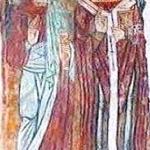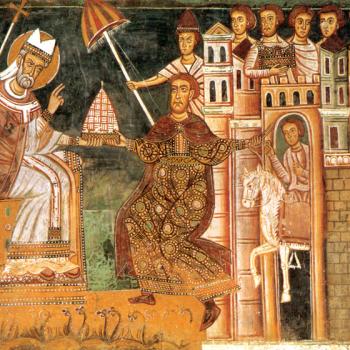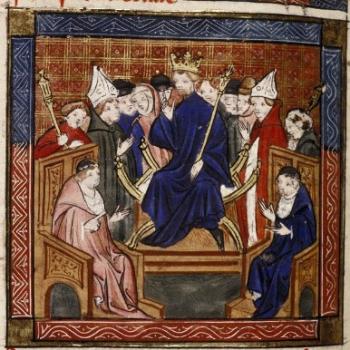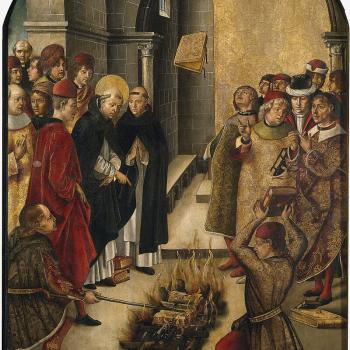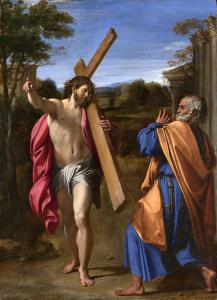
Way back when, I started a series of articles revolving around a few objections non-Catholics had to Catholicism that came out during an old debate. As promised, I planned on closing with an article on the topic of St. Peter’s historical connection with the city of Rome. Better late than never? I sure hope so! So here goes.
In the now over twenty year old debate, one of the non-Catholic objectors denied the claim that St. Peter had any historical connection with Rome (starting around 23:23 here). This is a claim that I have seen made by even Eastern Orthodox opponents of the papacy, though they would be seem to be exceptions. In response I offer three reasons to believe that St. Peter did indeed travel to Rome, where he was ultimately martyred.
Reason #1
The first reason to believe that St. Peter journeyed to Rome is the fact that Holy Writ testifies to this. It does, albeit in an indirect manner. 1 Peter 5:13 reads: “The church that is in Babylon, elected together with you, saluteth you: and so doth my son Mark” (DRB). The first thing to note is that Rome is not explicitly mentioned here. However, the Apostle Peter, who purports to be the author, says that he is writing from “Babylon”. What does this mean?
Modern scholarship has proposed three possibilities. The first is the oldest, and enjoys the most credibility in academia. That is the view that “Babylon” signifies Rome. But why use code? As the Lutheran scholar Oscar Cullman notes, “either [the author] wishes to avoid it [i.e. mentioning Rome] out of fear of the Roman authorities, or more probably, he used the term Babylon because in his day that city…had become a theological concept which could be applied especially well to Rome”.[1]
The other two views that have been put forward, —namely that “Babylon” is a reference to an ancient Egyptian military fortress, or that it refers to the literal city in Mesopotamia—still have their supporters. We need not be detained with here with a refutation of those views, but suffice it to say that it is not the favored view in academic circles.[2] What is more, the other two positions were unknown until at least the 13th century. This lack of historical support is directly related to the next two points.
Reason #2
Positively, the Early Church Fathers testify to the fact that St. Peter travelled to Rome, where he was ultimately martyred. Once again, it is beyond the scope of the present work to analyze the non-Canonical literature that is extant on this topic from the first century onward. These sources are analyzed in great detail, for example, in the works of Cullmann and Daniel O’Connor (another non-Catholic theologian).[3] Furthermore, the Fathers are unanimous on the authorship of 1 Peter, as well as on the fact that it was composed in Rome.[4] Add those together and you get Peter in Rome.
We will call but one witness here, and him because his words have been corroborated by modern archeological excavations under St. Peter’s.[5] This second century passage comes from Gaius, possibly a Roman Presbyter, who was countering an argument from his opponent Proclus. The latter made much of the fact that the Apostle Philip and his daughters are laid to rest in Hierapolis.[6] Gaius responds that he “can point out the trophies of the apostles. For if you are willing to go to the Vatican or to the Ostian Way, you will find the trophies of those who founded this Church”.
Although Gaius is writing at the very end of the second century, he reflects the tradition about St. Peter in the above. Eusebius of Caesarea (d. AD 339), who preserved Gaius’ words in his own work, says as much. Furthermore, as was mentioned above, this is Gaius’ claim is corroborated by modern archaeological excavations. Eusebius gives this two-fold proposition himself. The reader can go to Rome to see the evidence for themselves, or they can take Gaius’ (or his own) word on that matter. Moreover, he assumes it on fact because he is familiar with early literary sources.
Reason #3
The third reason is directly related to the second. Not only is there an ancient and strong tradition that St. Peter travelled to Rome where he was martyred, there is no competing tradition. The first time in history that the tradition is challenged was not until the twelfth century. It was first put forward by the Waldensians, who, not surprisingly, held to the principle of Sola Scriptura.[7] Once more though, 1 Peter 5:13 testifies to the reality of Peter’s Roman sojourn. If it is not clear to the reader, tradition (and modern scholarship) sheds light on that fact.
As O’Connor concluded on the subject of St. Peter in Rome: “It may be accepted that he did visit Rome. This tradition is too old, too varied, too unchallenged in antiquity to be challenged with any force in the present.”[8] That is not to say that O’Connor believed in the papacy, but this should at least be the starting point of the conversation.
[1] Oscar Cullmann, Peter: Disciple, Apostle, Martyr. Trans. Floyd V. Filson (Waco: Baylor University Press, 2011), p. 84.
[2] Cf. Cullmann, Peter, pp. 85-87; Daniel O’Connor, Peter in Rome: the Literary, Liturgical, and Archeological Evidence (New York: Columbia University Press, 1969), p. 15-17.
[3] Cullmann, Peter, p. 91-113; O’Connor, Peter, pp. 18-39.
[4] Achille Vander Heeren, “Epistles of Saint Peter.” The Catholic Encyclopedia. Vol. 11. New York: Robert Appleton Company, 1911. <http://www.newadvent.org/cathen/11752a.htm>.
[5] Cullmann, Peter, p. 117. Cf. O’Connor, Peter, pp. 205, 208.
[6] O’Connor, Peter, pp. 96-97.
[7] O’Connor, Peter, pp. 3-5.
[8] O’Connor, Peter, p. 50.


